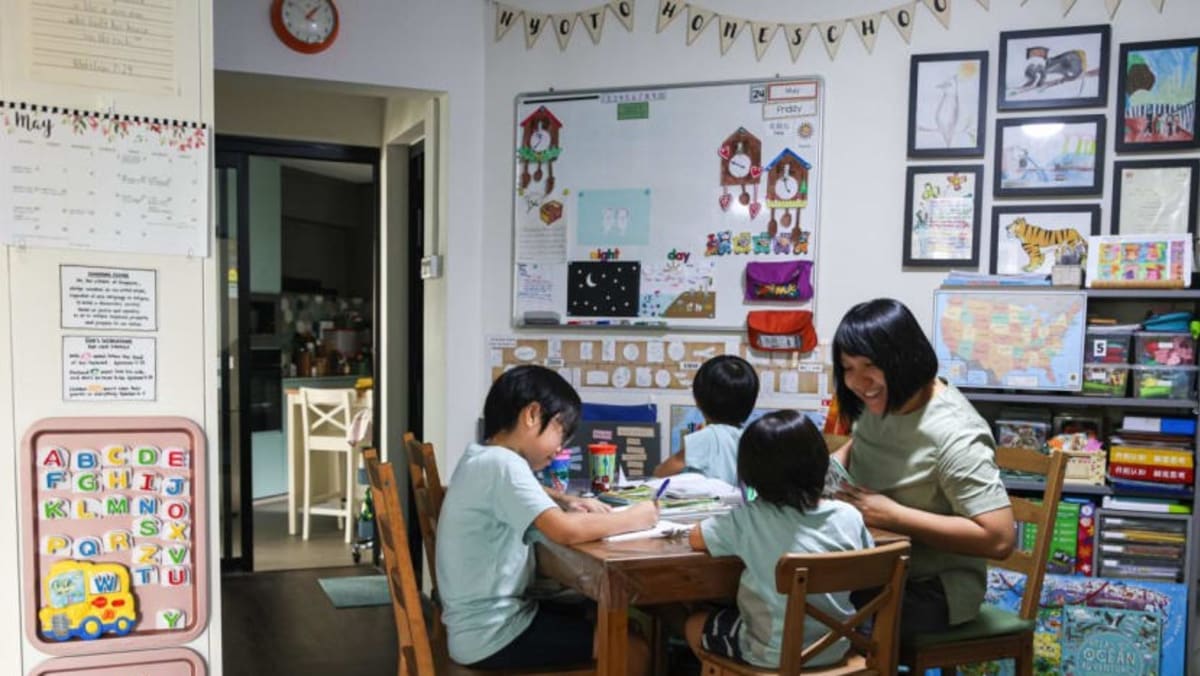CHALLENGES OF HOMESCHOOLING
While homeschooling affords flexibility and personalised education, it also presents its own set of challenges.
Each child has unique learning needs and paces, forcing parents to adapt by juggling multiple curricula and learning styles simultaneously.
Mrs Nyoto, who homeschools her three sons, said that the challenge lies in handling three curricula of different levels on her own.
“In school, teachers only focus on one level at a time. But for mums at home we have to tackle curricula of different levels at the same time,” she said.
Since she has all her children study at the same time, she must ensure that each receives individualised attention in subjects where they excel or struggle.
The key to managing this is taking turns – when one child works on a challenging subject, the other two are assigned more manageable tasks, allowing her to evenly divide her attention among all three.
“Like when I’m guiding one child, the other children will be assigned work they don’t need help with. Usually with English, they’re able to handle it so I can help another one with science or Chinese,” Mrs Nyoto said.
As for Ms Mattar, one of her challenges lies in helping her four children learn more advanced subjects as they get older and the material becomes more difficult.
“In school everything is prepared, you have all the teachers there and the children can learn everything they need. For us, we have to actively look, ‘Where am I going to find someone whom they can learn history from?’ for example,” she said.
To tackle this, some homeschooling families form a learning co-operative and share resources, with parents with expertise in specific subjects taking turns to teach a group of children.
These co-ops typically consist of five to eight families who meet regularly each week for lessons.
In terms of socialisation, parents also shared that many people have the misconception that homeschooled children are under-socialised.
According to those interviewed, this is where the co-operatives come in – by offering homeschooled children opportunities to interact with their peers and engage in social activities like sports through regular gatherings.
Associate Professor of Sociology Daniel Goh, from the National University of Singapore (NUS), said that he does not see any pedagogical issues with homeschooling, adding that homeschooling parents “are very well-resourced and resourceful in finding their own plug-ins to make sure their children do not miss out and are integrated in mainstream (society)”.
Several youths who had transitioned from homeschooling to tertiary education told TODAY that they generally enjoyed their homeschooling years, but some initially struggled with group work in university.
Mr Reuben Teo, 24, a first-year political science student at the Singapore Management University, said he had to adapt to his peers’ working styles in group projects due to the individual nature of homeschooling.
“I don’t have a problem working in groups, but homeschooling is a good and bad thing in that you can do the individual work by yourself easily enough, but when it comes to projects, you’re either so efficient that you get impatient waiting for the rest to catch up, or you just don’t know what to do,” Mr Teo said.
Ms Ariel Ess, a 24-year-old electrical and electronic engineering student at NUS who was fully homeschooled till 16, said she wished she had attended mainstream schools.
She initially struggled with social cues, citing an instance where a minor disagreement among her canoeing teammates caused her significant anxiety as she took it very personally.
“When you fight with your siblings at home, your parents will step in so there’s always a buffer. But when you go into work, internships or projects, there’s no one to tell you who is right, you have to come to a consensus on your own,” she said.
Ms Ess also felt that there might have been more opportunities for her to try different things and interact with people in a mainstream school setting.
“In homeschooling, we have the freedom to do things, but sometimes you’re not aware of the things you can try. Schools bring you out on outings or overseas and let you interact with other people and you get to hear from their experience as well.”
Associate Professor of Sociology Tan Ern Ser, a sociologist from NUS, said that homeschooled children may face such issues raised by Ms Ess when they miss out on having exposure to a microcosm of Singapore society by not participating in the mainstream system.
“The exposure would involve being in discussion groups, collaborating with fellow students in school projects, and learning how to relate to a diversity of fellow students,” Assoc Prof Tan said.







